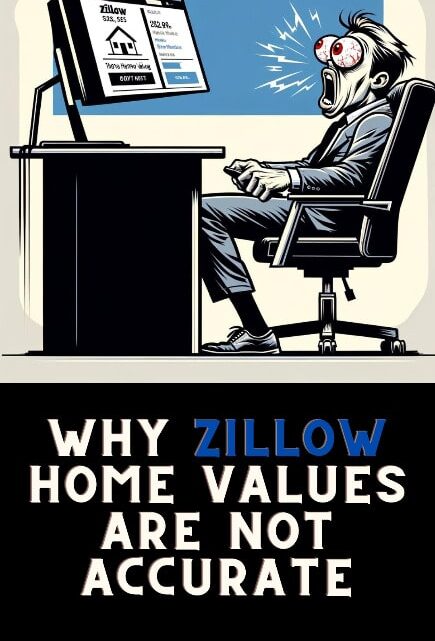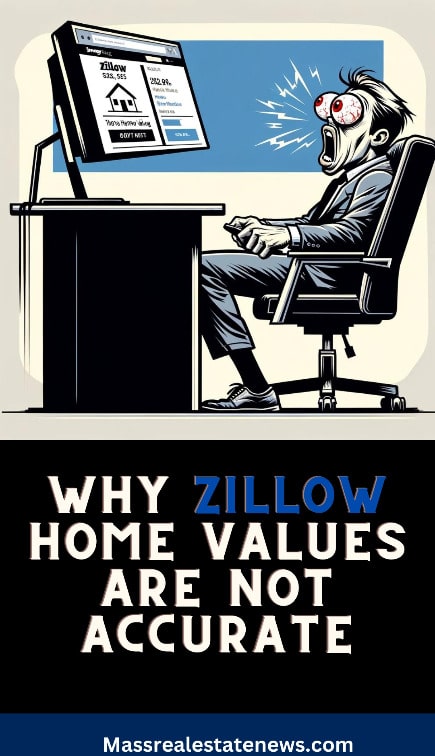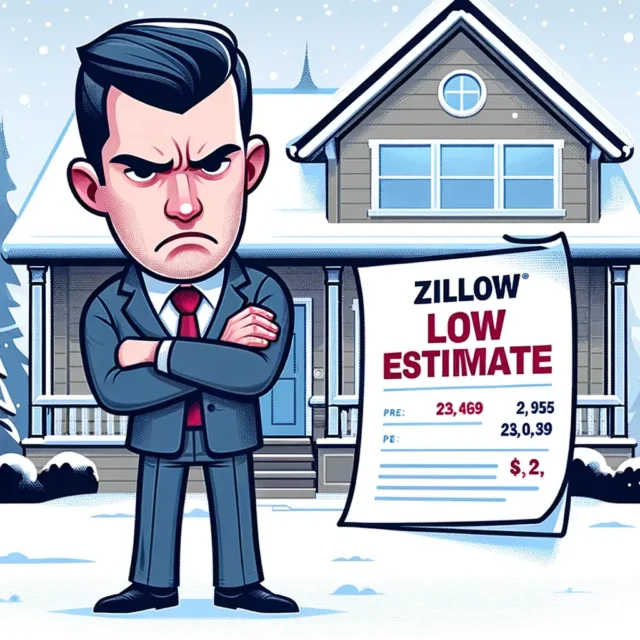Have you looked at your Zillow home value lately and wondered if that is what your home is worth? Did it seem out of wack? Don’t worry; you’re among the many Massachusetts homeowners who feel the same way.
Grasping Zillow’s home values can be like trying to catch a fish with your bare hands. Like water, these numbers slip and slide due to the unseen currents beneath the surface.
Zillow uses a system known as ‘Zestimate,’ which involves an algorithm pulling from public data. Unfortunately, this algorithm often misses out on critical factors such as changes in the property itself.
Subtle shifts in the local housing market can also go unnoticed.
Sometimes, the details missed are as integral to a home’s value as a bake is to a cake. Therefore, when obtaining a reliable estimate for your Massachusetts property, tread lightly with Zillow’s figures. After all, there’s more to a house’s worth than mere numbers.
While Zillow’s home value estimates can be a helpful starting point, they may not always reflect the precise market value of a property.
Factors such as recent renovations, local market conditions, and unique property attributes may not be fully captured in Zillow’s algorithms.
For a more accurate assessment, consulting with real estate professionals in Massachusetts who can provide a comprehensive evaluation based on local market expertise and in-person property assessments is advisable.
From many years of experience as a Massachusetts Realtor, it is clear that Zillow estimates of value are wrong more often than not. Clearly determining home values is not subjective. It takes the eyes of a professional to value real estate, not an algorithm.
Facts Worth Knowing
Zillow’s estimates, commonly known as “Zestimates,” are designed to give a ballpark figure of a home’s fair market value. They use a proprietary algorithm that considers various data points.
However, the accuracy of Zestimates can vary based on several factors:
- Data Availability and Quality: Zestimates tend to be more accurate in areas with much data available. In neighborhoods with similar homes and a high volume of recent sales data, Zestimates are likely to be closer to the actual market value. However, it can be more challenging for the algorithm to estimate rural areas accurately. They are also challenged by places where each home differs from the next.
- Market Volatility: Zestimates may not be as reliable in rapidly changing markets because they can’t always keep up with real-time changes in Massachusetts market conditions.
- Home Condition and Upgrades: Zillow may not have detailed, up-to-date information about the condition of a home. Renovations and upgrades that have been made can be missed. This can affect the accuracy of the Zestimate, as the algorithm might not account for features that could increase a home’s value.
- User-submitted Data: Homeowners can update information about their homes, influencing the Zestimate. However, if this information is inaccurate or not representative of the broader market, it could skew the estimate.
Zillow themselves note that Zestimates are a starting point in determining a home’s value and are not an official appraisal.
It’s worth noting that there are other online home value estimators, and they are just as bad for accuracy. CNN reports that Redfin’s online estimation tool has a median error rate of around 7%.
In my experience, none of the tools deliver accurately enough to rely on them.
Listed vs. Non Listed Homes For Sale
- Homes Listed for Sale: Zillow tends to have more accurate Zestimates for currently listed homes. This increased accuracy is likely because listed properties have more recent and detailed information. Listings include prices, recent photographs, detailed descriptions, and up-to-date property features. Zillow often claims a lower median error rate for these homes, meaning the difference between the Zestimate and the actual sale price is typically smaller.
- Homes Not Listed for Sale: Zestimates might be less accurate for off-market homes. This is because the data available for these properties might not be as current or comprehensive. The property’s condition, upgrades, or changes made since the last sale might not be fully accounted for in the public records or user-submitted data that Zillow uses to calculate its Zestimates. Consequently, Zillow’s median error rate for unlisted homes or pocket listings is generally higher than for listed homes.
How precise is the Zestimate? Zillow claims the median error rate for the Zestimate for on-market homes nationwide is 2.4%, whereas off-market homes have a median error rate of 7.49%.
I can’t image meeting with a prospective home seller and giving them an estimate that is off by over 7 percent. On a property valued at $600,000, it would be off by over $40,000!
One of the many home-selling mistakes that leads to disastrous financial consequences is overpricing!
Why Zillow Home Values Are Not Accurate in Massachusetts
Zillow has become a popular source for many individuals seeking to understand the value of their property. However, there are crucial limitations when relying on Zillow’s Zestimate feature.
The Zestimate uses complex algorithms to estimate the value of a home, but it is often inaccurate. A National Community Reinvestment Coalition study found that Zillow home values were within 5% of the actual sale price only about half the time.
There have been lawsuits claiming that Zestimate was off by more than 20% in some cases. Over the years, I have witnessed this myself first-hand.
The main issue stems from Zestimate’s heavy reliance on publicly available data. It may overlook critical factors such as property condition, renovations, or local market variations.
For example, the algorithm may not accurately account for variations in local markets, causing discrepancies between estimated and actual home values. This discrepancy can lead to frustration and disappointment for homeowners who rely solely on this information.
People ask all the time why their Zillow value can fluctuate so much.
Real estate agents play a critical role in determining the price of a home when it is being sold. They conduct market analysis, consider the home’s condition, define the target market, and set the listing price based on fair market value and competition.
They use hand-picked comparable sales. Not a bunch of homes thrown into an algorithmic bucket.
Estimates Differ From Professionals
Due to these personalized evaluations conducted by real estate professionals, Zillow’s home values might significantly differ from the selling price.
A downside to solely relying on Zillow’s estimates in Massachusetts is that they don’t reflect current market conditions and trends. This is particularly crucial given that local market conditions play a significant role in determining home value.
I emphasize that prospective buyers and sellers must be cautious when utilizing these online estimates for real estate decisions.
Understanding these limitations can help homeowners and potential Massachusetts buyers make informed decisions when valuing properties and navigating the real estate market effectively.
With an awareness of these shortcomings in mind, let’s examine Zillow’s broader challenges in providing accurate housing valuations.
Uncovering Zillow’s Shortcomings in Massachusetts
Zillow’s approach heavily relies on publicly available data when estimating the value of Massachusetts homes. But here’s where things get a bit tricky.
This public data might not always tell the whole story of a particular property. While it provides a general picture, it often overlooks essential factors specific to each home that real estate professionals consider when appraising a property.
The most substantial item that Zillow’s algorithm may not account for is recent renovations or additions that could significantly impact a home’s value. These details, crucial for an accurate assessment, can easily slip through the cracks with Zillow’s reliance on public data alone.
According to a study by Stanford University, Zillow’s home value estimates were found to have a median error rate of 4.5%. A bit more than Zillow’s estimations.
Furthermore, one key aspect that sets professional appraisers and real estate agents apart from Zillow’s algorithm is their ability to conduct detailed market analysis that accounts for local nuances.
This personalized approach enables them to consider the home’s condition, the target market, and competition in the area, which are all vital factors in determining a home’s value.
Limited Market Analysis
In contrast, Zillow’s algorithmic nature might restrict its ability to fully comprehend the complexities and fluctuations of local real estate markets. This can also lead to inaccuracies in estimated home values.
Zillow’s home values may not accurately interpret nuances such as neighborhood trends or demand variations.
It’s essential to recognize that while algorithms provide efficiency and speed, there are some limitations to be aware of. The intricate dance between supply and demand in local housing markets is not easily encapsulated by an equation alone.
This could explain why Zillow’s estimates still struggle to consistently reflect actual sale prices despite efforts to refine its algorithm.
A comparative analysis by the National Association of Realtors revealed that Zillow’s home values were off by an average of 8%. Such deviations underscore the significance of human insight in understanding complex market dynamics.
For example, in a seller’s market where demand outstrips supply, properties may command higher prices than those reflected in Zillow’s property value due to intense buyer competition.
Conversely, in a buyer’s market with an oversupply of properties, actual sale prices could fall below Zillow’s estimate.
Seasonal Adjustments
Here in Massachusetts, real estate is very seasonal. The bulk of activity and sales occur in the spring. Homes listed for sale in the winter will do worse than homes in the spring. There can be a significant difference in pricing in just a few months.
It will often take an algorithm a while to notice this fact.
Zillow certainly offers convenient access to information. However, relying solely on its house values may not accurately reflect real-time market conditions.
Understanding the widespread discrepancies in automated home valuation tools sheds light on real estate agents’ pivotal role in providing accurate assessments.
Let’s now turn our attention to examining how these professionals determine a home’s actual value.
The Role of Massachusetts Real Estate Agents in Home Valuation
When determining a home’s value, real estate agents bring a wealth of knowledge and experience. They aren’t just relying on algorithms and public data.
Agents use their insight and understanding of local markets to provide more accurate valuations.
Here’s how they do it.
Comprehensive Market Analysis
Real estate agents delve deep into the market to understand different neighborhoods’ trends, demands, and unique characteristics.
By carefully analyzing recent sales data and current listings, they can gauge the pulse of the local real estate market. This allows them to make informed judgments about a property’s actual value.
This is something a Zillow home value can’t do.
Consideration of Property Conditions
A crucial aspect that sets real estate agents apart from automated valuation tools is their ability to consider the condition of a property.
They consider any renovations, upgrades, or unique features that could significantly impact its value. Unlike algorithm-based estimates, real estate agents can assess a home’s tangible and intangible aspects.
Visiting a property to see all the nuances beats relying on Zillow home values.
Defining Target Markets
Real estate agents understand the dynamics of target markets. They know the potential buyers, what they are looking for, and what factors might capture their attention.
This understanding allows them to tailor their valuation based on potential buyers’ preferences and expectations.
Setting Listing Prices Based on Fair Market Value
One of the critical roles of real estate agents is to set listing prices that align with fair market value. Their expertise in understanding local competition and pricing trends enables them to position a property competitively.
This strategic approach attracts potential buyers and ensures sellers get optimal property value.
Their personalized approach provides a more thorough and reliable valuation than algorithm-based estimates.
For instance, consider a scenario where an algorithm does not account for recent renovations made to a property. These renovations may significantly enhance its value. However, without a human touch, such enhancements might be overlooked by an algorithmic estimation tool.
Real estate agents bring a personalized touch to the valuation process. They visit properties, assess their unique attributes, and understand how these elements contribute to their value.
In understanding how real estate agents play a crucial role in determining home values, we gain insight into the importance of multiple listing services (MLS) in providing accurate and extensive property information.
Let’s explore this valuable resource in detail.
Importance of Multiple Listing Services (MLS)
When valuing a home accurately, the power of information cannot be overstated. Multiple Listing Services (MLS) are treasure troves of information for real estate professionals. They offer a centralized database containing a wealth of property details.
From square footage and number of bedrooms to recent renovations and property history, MLS platforms provide comprehensive and up-to-date data on properties for sale.
This rich pool of information is crucial in ensuring that home valuations are based on concrete, tangible data rather than unreliable estimates.
Massachusetts Real estate professionals rely on MLS to access accurate property information. The database allows them to conduct thorough comparative market analyses and make well-informed pricing decisions.
Unlike Zillow’s Zestimate, which relies on automated algorithms and publicly available data that may not always capture a property’s nuances, licensed real estate agents maintain and update MLS listings.
An agent’s level of oversight ensures that the information is reliable and reflects a property’s actual characteristics and value.
Accuracy and Credibility
The accuracy and credibility of MLS data are unparalleled when it comes to determining property values. By leveraging this robust platform, real estate professionals can access recent sales data, pending sales, contingent sales, and active listings.
This comprehensive insight helps them gauge market trends, analyze comparable properties, and ultimately arrive at more precise valuations.
The meticulous nature of MLS listings offers a level of transparency that is essential in the valuation process. With detailed photographs, property descriptions, and historical data readily available, real estate agents can accurately picture a property’s worth.
They consider its unique features and any relevant market dynamics.
Data-Driven Decision Making
In essence, MLS empowers real estate professionals to make data-driven decisions firmly grounded in the reality of the local housing market. This contrasts sharply with Zillow’s Zestimate feature’s limitations.
A computer lacks human insight and local experts to accurately assess intricate variables influencing property values.
MLS platforms foster more informed decision-making by providing real-time information on market conditions, pricing trends, and comparable sales within specific neighborhoods or regions.
Ultimately, the comprehensive nature and reliability of Multiple Listing Services equip real estate professionals with the essential tools needed to evaluate properties with precision and insight.
This capability surpasses the limitations of automated valuation models like Zillow’s Zestimate.
Inaccuracy Consequences on Homeowners
Relying on inaccurate Zillow home value estimates can significantly impact the sale of a property in various ways. One such consequence is the potential development of unrealistic expectations by homeowners regarding the value of their homes.
From experience, I know this to be true. Over the years, I have met many clients who mentioned, “Zillow said my home was worth X.”
When Zillow’s estimates are inflated or deflated, it can lead to a mismatch between the homeowner’s expectations and the reality of the market. It can be frustrating for agents who have to build trust.
It is human nature to want to believe something too good to be true. Do you think someone wants to hear their home is worth $525,000 when Zillow says it’s worth $550,000? They certainly do not!
This can result in dissatisfaction during actual sales negotiations, as homeowners may be unprepared for the actual market value of their property. It’s similar to being handed a map with false directions. The result is frustration and disappointment.
Anyone who listened to their car’s navigational directions lead them astray can vouch for that.
Increases The Risk of Financial Mistakes
Purchasers who rely solely on Zillow home values could be put off by an overpriced property or view an underpriced listing with suspicion.
Such disparities may also affect the speed and outcome of the selling process since homes that are priced too high may languish on the market unsold.
Perhaps even more concerning is the impact on aspiring buyers who take Zillow’s valuations at face value. They may buy overvalued homes or miss out on great deals due to underestimations.
These discrepancies have far-reaching effects on individuals making one of their life’s most significant financial decisions.
The Ripple Effect
It’s not just about selling or buying homes at unfair prices. It has ripple effects on other aspects, including financial planning and stability.
Overpricing may lead to more extended periods on the market. Due to ongoing mortgage payments and taxes, it can impact a homeowner’s finances.
Eventually, it could lead to price reductions that cause a loss for sellers.
On the other hand, undervaluation means missed opportunities for homeowners to gain greater profits from their investments.
As a result, homeowners must recognize and understand the limitations of Zillow’s estimates. Seeking professional guidance when determining the actual value of their property is wise.
Real estate agents with expertise and market knowledge play a vital role in this process. Skilled agents offer guidance beyond computer-generated estimations.
Recognizing these consequences provides clarity to homeowners aiming to make informed decisions about selling their properties. It emphasizes the need for professional insight in navigating this complex landscape.
Alternatives to Zestimate for Accurate Home Values
When it comes to understanding the actual value of your home, relying solely on platforms like Zillow may not always provide the most accurate picture.
While the website can be a valuable tool for gaining a general sense of housing market trends, property estimates, or availability, it’s essential to seek more reliable sources when determining the actual value of your home.
I love everything about Zillow except their home value estimates.
Here are two viable alternatives to consider:
Real Estate Agent Valuations
One effective alternative to Zillow’s Zestimate is consulting with experienced real estate agents for personalized property valuations. This is the best avenue to take when you’re selling a home.
Picking someone who does a significant amount of business with sellers is wise. You want a top listing agent, not just anyone with a license.
The best Massachusetts agents utilize their extensive local market knowledge and in-person property assessments to estimate a home’s value.
These valuations are based on thorough market analyses, considering recent sales data, neighborhood conditions, and specific property features.
Unlike automated algorithms Zillow employs, real estate agent valuations offer a human touch. There are personalized insights that can accurately represent a home’s worth.
Professional Appraisals
Another very reliable way to get estimates, aside from Zillow’s, is to seek professional appraisals from licensed appraisers. A professional appraisal involves a thorough inspection of the property. There will be a comparison with the real estate market, placing the valuations arrived at as accurate and unbiased.
Appraisers consider various factors. They include property condition, location, recent sales within the area, and unique property attributes to draw an exact market value.
This approach ensures a more profound analysis that may not be possible with the surface-level calculations carried out by automated valuation models on online platforms.
A professional appraisal commands more trust from homeowners in the valuations’ accuracy. They can make sound decisions regarding their real estate investments. The cost of a real estate appraisal is worth it.
Will It Ever Work Better Than Professionals?
It will be a while before I see online value estimators beating humans for accuracy.
A study by Du, Gu, and Zhu (2021) highlighted the significance of preprocessing real estate datasets and feature selection in improving Zillow estimate accuracy.
They concluded that among the tested models, Linear Regression performed better in minimizing the error between the predicted and actual sale prices (Si-Hao Du, Yi. Gu, & Yuewei Zhu, 2021).
Conclusion
A homeowner can understand their home value accurately by working with seasoned professionals. It allows consumers to make sound decisions in buying, selling, or refinancing properties.
In the complex world of real estate valuation tools, looking across multiple sources is best to ensure homeowners have a fair shot at the most accurate information. But at this point, nothing can replace a trusted professional.
A Zillow home value should never be trusted when making significant life decisions.
If you are in the Metrowest, Massachusetts, area and are considering selling your home, I would love to help. Contact me for an interview.












No Comment